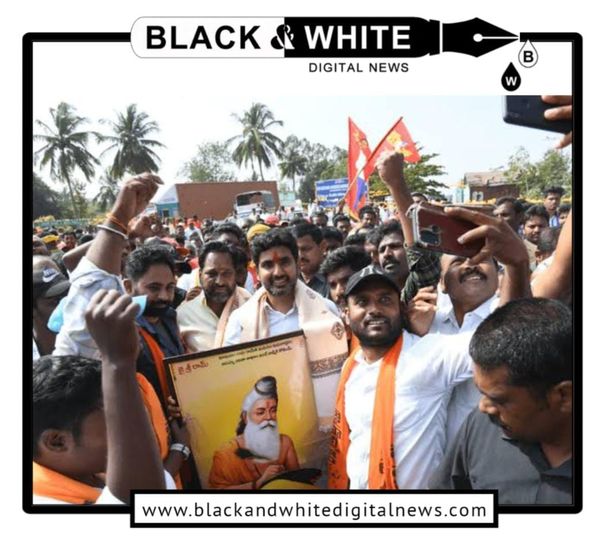Valmikis to Cast Vote in J&K Assembly for the First Time: Will Their Support Propel BJP to Victory?
||Black and White Digital News||
||Tejveer Singh September 10, 2024||
Jammu: In a historic moment for the Valmiki community in Jammu and Kashmir, the 2024 assembly elections will mark the first time they can exercise their right to vote in the region. The Valmikis, a marginalized community that migrated to the state under the promise of permanent residency in 1957, have long been denied basic rights — a story often overshadowed in the political discourse of the region. With the abrogation of Article 370 and 35A in 2019, however, their decades-long fight for equal opportunities finally saw a breakthrough, as they gained the legal right to education, employment, and property ownership. This new status has opened doors that had remained shut for over 60 years.
The Backstory: A Broken Promise from 1957:
The roots of the Valmiki issue trace back to a lesser-known episode in Jammu and Kashmir’s history. In 1957, the state’s sweepers went on strike, leaving the government scrambling for a solution. In response, then “Prime Minister” of J&K, Bakshi Ghulam Mohammed, made an appeal to the Valmiki community in Punjab’s Gurdaspur and Amritsar, promising them permanent residency and associated rights if they relocated to Jammu. Tempted by the offer of stability, many families migrated to J&K in search of better lives.
But those promises of residency and rights proved hollow. For decades, the Valmikis were locked in an invisible struggle for recognition. Meena Gill, a member of the community, recalls how the system failed her in 2001. “When I applied to pursue an MBBS degree, I needed to submit proof of residency. That’s when I found out that our caste wasn’t recognized as permanent residents of Jammu and Kashmir. I couldn’t be issued a permanent residency certificate, and without that, there was no future here.”
Meena’s story is not unique. For years, the Valmikis of Jammu and Kashmir languished in a legal limbo. They were denied the ability to pursue higher education, formal employment, and even property ownership. “For years, seeing my struggles, many youngsters dropped out of school, convinced there was no future for them, and turned to odd jobs in the informal sector,” she reflects with a sense of frustration.
Predatory Conversions and Societal Struggles:
Deprived of opportunity and identity, the Valmiki community also became vulnerable to predatory conversions. In the Valmiki colony in Jammu, a troubling sight emerged — posters of Christian and Muslim evangelists adorned the walls and pillars, an indicator of the constant efforts to convert vulnerable Valmiki Hindus. Without the power to integrate into mainstream society, some community members felt pressure to embrace other religious identities that appeared to offer more security and stability.
Bhatti, a prominent voice in the Valmiki community, lamented how these vulnerabilities were exploited. However, things began to change when the BJP rose to prominence in 2014 under the leadership of Narendra Modi. “Our people saw hope in Modi,” Bhatti explains. The BJP’s stance on Hindutva and its commitment to uplifting marginalized communities gradually drew the Valmikis towards them.
The shift became more apparent following the repeal of Article 370 and 35A. With these constitutional provisions rendered void, Valmikis could finally secure the basic rights they had long been promised. For the first time in decades, they could apply for government jobs, purchase property, and — perhaps most significantly — vote in state elections.
The First Vote: Valmiki Support and BJP’s Surge:
The political significance of the Valmiki vote cannot be understated. According to Bhatti, the community numbers 50,000 strong across the state, with around 5,000 concentrated in Jammu’s Valmiki Colony alone. Many Valmiki men continue to work for the Jammu Municipal Corporation (JMC), as their families have done for generations.
This voting bloc could be a game-changer in the upcoming assembly elections. “We are planning to vote for the BJP en masse,” Bhatti affirms. The Valmikis see the BJP as the party that finally delivered on the promises made to their ancestors in 1957. Their long-lost dignity, Bhatti says, has been restored, and the community now feels empowered to shape its future.
For Vijayanand Gill, another Valmiki elder, the change is palpable. “For the first time, we have hope. We can finally be who we are — residents of Jammu and Kashmir, not outsiders in our own land.” He proudly sips his tea, with the national flag flying high, symbolizing the newfound pride of his people.
But despite the optimism, there is also a sense that the journey towards full integration is far from over. While stone-pelting has subsided and a sense of normalcy has returned to the region, many Valmikis, like others in Jammu and Kashmir, still grapple with the remnants of a system that once kept them on the margins.
Looking Ahead: A Historic Vote:
As the Valmikis of Jammu and Kashmir prepare to vote in the assembly elections for the first time, their support could prove pivotal in determining the political future of the state. Having endured decades of neglect and systemic injustice, their newfound voice is a testament to their resilience and determination. The BJP, which has already garnered considerable support from the community, stands to gain further ground in the region.
For now, the Valmikis’ story is one of hope and transformation. From broken promises in 1957 to newfound rights in 2019, their journey is emblematic of the broader changes sweeping through Jammu and Kashmir. But with many challenges still ahead, the community is keenly aware that this vote is just the beginning of a long road to true equality.



